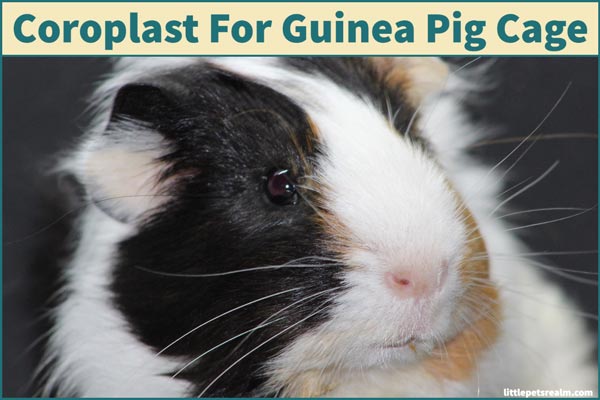Last updated on May 21st, 2022 at 09:48 am
As a guinea owner, you have to clean their cage, bedding, and other accessories regularly and you might be looking for a cage cleaner that works great. And, you may like to get some ideas about natural and homemade cleaners for the cage of your guinea pig.
So, what is the best way to clean the guinea pig’s cage?
As guinea pigs are sensitive to many chemicals, the best way to clean a guinea pig’s cage is to use a natural cleaning agent such as vinegar and water mix. These kinds of cleaners are relatively cheap, easy to make at home, and safe for your guinea pigs. Using these natural cleaners will help keep your guinea pigs healthy and their cage clean.
You can also use clean the cage and its accessories with a small portion of bleach or a mild soap with water to clean them
However, you can’t use all types of cleaners for guinea pig cages such as baking soda.
Today, I will give you some unique ideas and tips regarding that.
I will also tell you about things to consider before using cage cleaners and explain why you need natural cleaners for guinea pigs’ cages, how to make them and how to use them.
Table of Contents
5 Homemade DIY Guinea Pig Cage Cleaner Ideas
Let’s take a look at the top 5 homemade cleaners for guinea pigs cages with their pros, cons, and ways to use.
1. Vinegar
Vinegar is the best and most popular homemade cleaner for guinea pigs’ cages. This is because vinegar is a natural disinfectant and it is also very effective in removing dirt, grime, and stains.
Vinegar is also very cheap and can be found at any grocery store.
You can clean almost anything from your guinea pig’s cage with it.
You can clean their cage grids, floor, bedding, water bottle, hay racks, hide house, food bowl, toys, and litter box with a solution of vinegar and water.
Ingredients
To clean the guinea pig cage with vinegar, you will need:
- White vinegar
- Warm water
- A small bucket or container
- Spray bottle
- Paper towel, Washcloths, rub, or a soft brush, such as a toothbrush or nail brush
Directions
1. Take out your guinea pig from the cage.
2. Remove all of the bedding, toys, and food bowls from the cage.
3. Pour a small amount of warm water into your bucket or container.
4. To use vinegar as a cage cleaner, simply mix it with water in a ratio of 1:1. You can add ¼ to ½ cup of white vinegar and stir the mixture until the vinegar is completely dissolved.
5. Then, pour the solution into a spray bottle and spray the mixture directly onto the affected areas of your guinea pig cage, liner, or other supplies.
6. Allow the mixture to sit on the cage for 5-10 minutes to disinfect and remove any dirt, grime, or stains.
7. Next, wipe the surface with washcloths, a paper towel, rub, or a soft brush.
8. Rinse the cage thoroughly with warm water to remove all traces of the vinegar.
9. Finally, allow the cage to air dry or use a clean towel to dry it off. Be sure to let the cage dry completely before adding any bedding or putting your guinea pig back inside.
Know more about the best flooring ideas for guinea pigs.
Cleaning tips
– You can also use vinegar to clean your guinea pig’s water bottle and food bowl. Simply soak the items in a vinegar-water solution for about 5 minutes and then rinse them thoroughly with water.
2. Mild detergent and water
Another great homemade cleaner for guinea pig cages that’s readily available is mild detergent and water.
However, never use harsh and fragranced detergent as it will cause health issues for the guinea pigs.
You can use baking soda to clean the entire cage, or you can use it to spot clean specific areas.
This solution is also very effective in eliminating dirt, debris, or guinea pig waste.
However, you have to make sure that you remove all the traces of detergent after cleaning the cage. Otherwise, it can be harmful to your piggies if they eat a portion of it.
Ingredients
-1/4 cup of mild detergent
-1 gallon of warm water
Directions
-Mix the ingredients in a large bucket or basin.
-Dip a clean rag or sponge into the solution and wipe down the entire cage.
-Rinse the cage with clean water and remove all remaining detergent completely from the surface.
– Dry it completely with a clean towel.
Cleaning tips
-You can also use this solution to clean their water bottle, food bowl, or any other accessories.
-Be sure to remove all traces of mild detergent from the cage
-When using this solution, it’s important to ventilate the area well to avoid any harmful fumes.
3. Mild soap and water
The simplest way to clean a cage of guinea pigs is with soap and water. You can use any mild liquid soap.
Avoid using harsh, fragranced soaps as these can irritate your guinea pig’s sensitive skin.
Ingredients
– Mild liquid soap
– Warm water
– Sponge or cloth
Directions
To use soap and water to clean a guinea pig cage:
1. Remove your guinea pig from the cage.
2. Take out all of the bedding, toys, and food bowls from the cage.
3. Fill a bucket or sink with warm water and add a small amount of mild liquid soap.
4. Soak a sponge or cloth in the mixture and use it to wipe down all surfaces of the guinea pig’s cage, including the floors, bars, and any accessories.
5. Rinse all surfaces with clean water to remove the soap residue, then allow the cage to air-dry before returning your pet.
If you clean the cage regularly with soap and water, make sure that there is no trace of soap after cleaning the cage or it will be dangerous for your little pig.
Cleaning tips
– If you have a larger cage or many accessories, it can be time-consuming to clean all of these surfaces with soap and water. You may find it useful to use a small scrub brush or toothbrush to help you clean hard-to-reach areas.
– You can also use this mixture for their accessories.
– Wipe down the cage with clean water and after that rinse properly to remove any residual soap because it can be harmful to your little pig.
4. Bleach
If you are dealing with a very dirty guinea pig cage, bleach can be an effective way to clean it.
However, keep in mind that bleach can be dangerous for guinea pigs and is not recommended as a regular cleaning solution. In addition to being toxic, there are certain areas of the cage that bleach simply won’t be able to clean, such as corners and crevices.
When using bleach to clean a guinea pig cage, it is important to dilute the bleach extremely well before you apply it to the cage.
Ingredients
- 1 part bleach
- 32 parts water
- Spray bottle
- Cloth or sponge
Directions
1. Take out your guinea pigs and their accessories from the cage.
2. Combine the bleach and water in a bucket. To make a cleaning solution with bleach, mix 1 part bleach with 32 parts water, that’s 1/2 cup bleach to 1 gallon of water. Using a strong solution is harmful to your little pig.
3. Next, pour the cleaning solution into a spray bottle and spray the mixture over the areas of the cage that are dirty.
4. Let the cleaning solution sit for several minutes, and then use a cloth or sponge to wipe the cage down.
5. Wipe away the cleaning solution until you have removed all of the dirt and grime from the cage.
6. Once you have finished cleaning the cage, rinse it out thoroughly with clean water to remove all traces of bleach.
7. Allow the cage to air dry. Store the cage in a cool, dry area until you are ready to use it again.
Cleaning tips
– Avoid using too much bleach when cleaning the cage. Too much bleach can be harmful to the guinea pigs.
– Be sure to rinse the cage thoroughly after you have cleaned it, as bleach can be toxic if it is ingested by your pet.
– If you have any questions about how to safely clean a guinea pig cage with bleach, consult your veterinarian.
5. Baking soda
Baking soda is a popular and natural cleaner. However, it’s not the ideal cleaner for the guinea pigs’ cage. In fact, it’s dangerous for your guinea pig’s health. This is because if they accidentally eat a portion of it it will cause serious complications.
However, the reason for listing this here is you can use it to control the odor of a guinea pig cage. Baking soda is useful for absorbing unwanted odors.
But, how to use it safely? Let’s find it out.
Ingredients
– Cage cleaners such as vinegar and water
– Baking soda
– Washcloth or sponge
Directions
1. First of all, clean the cage and bedding following one of the above methods (such as vinegar water) that I have described above.
2. Rinse the cage thoroughly with water to remove any residue.
3. Allow the cage to air dry completely before putting baking soda.
4. Simply sprinkle a very small amount of baking soda on the bottom of the cage to reduce odor.
5. Put the liner and bedding to build the bottom of the guinea pig’s cage. First, place the liner (e. g. coroplast). Then, put the new bedding (e. g. fleece, natural paper, or wood bedding). You should cover the baking soda perfectly so that the guinea pig doesn’t have any access to it.
Tips and precautions
– Make sure you use a very little potion of baking soda to use safely.
– Be very careful that the guinea pigs don’t come in contact with that at any cost.
– While spreading the baking soda guinea pigs and their bedding and their other accessories must be taken out of the cage.
Why should you need natural cleaners in a guinea pig’s cage?
One of the biggest reasons why you should use natural cleaners in a guinea pig cage is because these animals are sensitive to many chemicals and cleaners. If you use harsh or heavy-duty cleaners in your guinea pig cage, it could damage the health of your pet and make them sick.
Additionally, natural cleaners are much gentler on a guinea pig’s skin and fur than chemical-based cleaning products.
Another reason why you should use natural cleaners in a guinea pig cage is that it can be difficult to find chemical-based cleaners that are safe for your guinea pig.
Many cleaning products contain harsh chemicals that can be harmful to guinea pigs, and these chemicals may even make your pet sick if they come in contact with them.
Which materials should you avoid cleaning the guinea pig’s cage?
The first thing that you need to consider before cleaning the guinea pig cage is which materials you should avoid using.
Some common household items can be dangerous to your guinea pig’s health.
For example, though it’s a great cleaner for many pets, it is toxic and will harm a guinea pig if they come into contact with it.
The fumes from baking soda can be harmful to your guinea pig’s respiratory system. Instead, opt for a natural cleaning agent that is safe and effective, such as a vinegar and water mix.
Another important thing to keep in mind when cleaning the guinea pig’s cage is that you should always use natural cleaning products.
Guinea pigs are very sensitive animals, and they can be harmed by many of the chemicals found in traditional cleaning agents.
For this reason, it is best to stick with natural products like vinegar. These cleaners are safe for your guinea pig and will not harm their sensitive skin or respiratory system.
You should also avoid using bleach or ammonia-based cleaners when cleaning their cage, as these can be dangerous for them if they inhale them. Even if you use a product like bleach, take safety measurements.
How often do you need to clean the guinea pig’s cage?
You need to do spot-cleaning every day to remove food debris, dirt, and soiled litter. Moreover, deep cleaning is recommended at least once a week to keep your guinea pig healthy. However, sometimes, you may need an unscheduled deep cleaning when the cage get’s to dirty.
You will know it is time for deep cleaning when the smell of the cage becomes overwhelming, or you see mold growing inside the cage.
But, how often you need to clean the guinea pig cage will depend on a number of factors, including the size of the cage, the number of guinea pigs in the cage, and what kind of litter material is used.
Things to consider before using natural cleaners for guinea pigs cages
Before using any type of cleaner, you should take into consideration the following 10 factors:
The size of the cage
You will need to know the dimensions of your guinea pig’s cage in order to determine how much cleaner you will need to make it.
The number of guinea pigs you have
In order to effectively clean the cage, you will need to account for the number of pets you have and how much cleaner you will need to make.
The location of the cage
The location where you keep your piggies’ cage can also affect what type of cleaners you can use.
If you keep the cage inside, then you can use any type of cleaner on it.
However, if you keep the cage outside, then you need to be careful about using any cleaners that contain chemicals, as these can be harmful to your piggies if they inhale them.
The type of material the cage is made from
You will need to take into account what the cage is made out of before you start cleaning it.
If the cage is made from plastic, metal, or glass, then you can use most cleaners on it.
However, if the cage is made out of wood, then you need to be careful what cleaner you use, as not all of them work well with wood.
For indoor cages, consider whether or not the cage is wire mesh, solid plastic, or a hybrid of the two.
This can impact which types of cleaners you use when cleaning the guinea pig cage.
The age and size of your guinea pig
The younger and smaller the guinea pigs are, the more sensitive they will be to different cleaners.
You should avoid using strong chemicals on them because this can make them sick or even kill them.
Before you start cleaning their cage, you should try out a little bit of the cleaner on them to make sure that it doesn’t bother them too much.
The type of bedding you use
The type of bedding you use can also affect what type of cleaner you can use.
If you use paper-based bedding, then you should avoid using any cleaners that contain bleach, as this can cause the paper to break down and fall apart.
The smell of the cleaner
Some cleaners have a very strong smell, which can be overpowering for your guinea pig.
If you are using a cleaner with a strong smell, then you should make sure that the enclosure is well ventilated so that they don’t have to suffer from the strong smell.
The ingredients in the cleaner
You should always check the ingredients of the cleaner before you use it, as some of them can be harmful to a guinea pig.
If you are unsure about any of the ingredients, then you should contact the manufacturer and ask them if the cleaner is safe to use on guinea pigs.
What type of litter you use in the cage
The type of litter you use can also affect what type of cleaner you can use.
If you use clay-based litter, then you should avoid using any cleaners that contain chemicals, as these can cause the clay to break down and be harmful to your guinea pig.
However, you shouldn’t use cat litter for guinea pigs. Know which litters are best for them.
What kind of food and water dishes you have in the cage
When you are cleaning your guinea pigs’ cages, it is important that you remove their food and water dishes as well.
If you don’t do this, then the residue from the cleaner may end up in their food or water, which can make them sick.
You should also keep your hands away from both of these items while you are cleaning the cage, as any residue on your hands can get into the food and water. This will make your guinea pig sick.
After taking all of these things into consideration, you can then decide which type of cleaner is best for your guinea pig’s cage.
If there are any toys or other objects in the cage
If there are any toys or other objects in the cage, then you need to make sure that you remove them before you start cleaning.
This is because some cleaners can damage or discolor these objects.
How often you plan on cleaning the cage
You should only clean the guinea pigs’ cage when it is necessary. Once a week is good for guinea pigs.
Cleaning too often can actually be harmful to your guinea pig, as it can strip away the natural oils from their skin.
You should only clean their cage when it is visibly dirty or when you notice any signs of illness in your pets.
The overall cleanliness of the cage
You should always make sure that the cage is clean before you start using any cleaners on it.
This means that you should remove any waste, urine, or other debris from the cage before using any cleaners.
This will help to reduce any mess and keep your little pigs’ cage clean and healthy.
Your own health and safety
You should also keep your own health and safety in mind when using any type of cleaner. If you are exposed to certain chemicals on a regular basis, then they can start to affect you over time, so it is important that you protect yourself as well.
Cleaning tips for cleaning guinea pigs cage:
- Wear gloves while cleaning to protect your hands from bacteria and chemicals.
- Avoid using cleaners with strong odors as they can be overwhelming for your guinea pig and potentially harmful.
- Never use cleaners containing ammonia, bleach, or other harsh chemicals as these can be toxic to your guinea pig.
- Use a vacuum to clean any pet hair, dust, and fur that may have fallen into the cage.
- Rinse off all cleaning supplies with warm water and dry the cage thoroughly before replacing your guinea pig.
- If you use a vinegar-water or bleach solution to clean the cage, make sure to rinse the cage thoroughly with water before replacing your guinea pig.
- It is best to clean your guinea pig’s cage on a regular basis, ideally once per week. However, the frequency of cleaning will depend on several factors such as the size of the cage, the number of guinea pigs, and how often the cage is used.
Conclusion
There are a number of different homemade cage cleaners used for pets, but you can’t use all of them. This is because guinea pigs are prone to respiratory, digestive, and other health issues.
The best homemade cleaner for a guinea pig’s cage is a vinegar-water mix because
You can also use mild soap or bleach diluted with water to clean the cage. However, you have to take extra precautions for that.
When choosing a cleaner for the guinea pigs’ cage, it is important to keep in mind a few things, such as the type of cleaner, the frequency of cleaning, the overall cleanliness of the cage, your own health and safety, and what kind of food and water dishes you have in the cage.
By following these tips, you can keep your guinea pigs’ cage clean and healthy for your pets.

I am Pallab Kishore, owner of Little Pets Realm. I share important tips, advice and answer all the queries to solve various problems about small pets such as guinea pigs and hamsters on this website.



